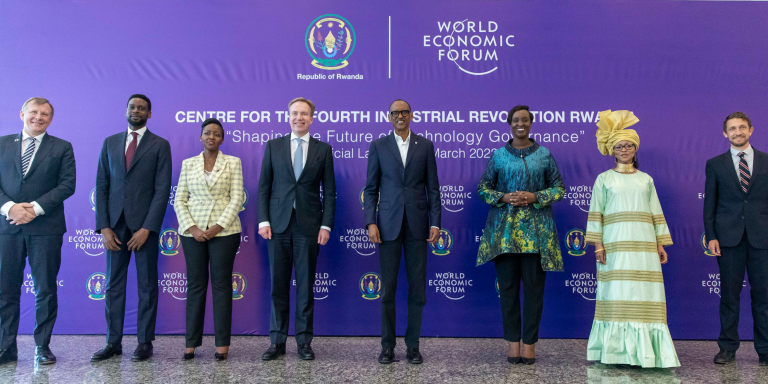
On March 31, in Kigali, the capital of Rwanda, in the presence of President Paul Kagame, the Rwandan Ministry of Information Technology, Communication and Innovation and the World Economic Forum inaugurated the Center for the Fourth Industrial Revolution, C4IR. Its role is to promote emerging technologies but it focuses mainly on artificial intelligence and data policy. Its goal is to develop partnerships to stimulate innovation and large-scale adoption for the benefit of society.
The C4IR
World Economic Forum’s mission is to ” help leaders anticipate, understand and shape the trajectory of technological change for human-centered, socially beneficial outcomes.”
It hosts a global network of 15 centers for the fourth industrial revolution, the C4IR Network. Their goal is to shape new policies and strategies in areas such as artificial intelligence, blockchain and digital assets, the Internet of Things, or autonomous vehicles and enable agile implementation and iteration. The one in Rwanda is dedicated to research and development in artificial intelligence. It follows the agreement signed between the World Economic Forum and the Rwandan government at the Davos summit in 2020.
Børge Brende, President of the World Economic Forum, delivered the opening speech, of the launch ceremony of the Kigali center, in which he recalled the role of C4IR networks to harness converging technologies to create an inclusive and human-centered future. He stated:
“This is the first center to be officially launched in Africa. It speaks volumes about the country’s leadership in leapfrogging and being visionary in new technologies. I believe that this Center for the Fourth Industrial Revolution in Rwanda will play an important role in achieving the ratio of Rwanda becoming an upper middle-income country by 2035. The center, I hope, will be a key catalyst in Rwanda’s goal of becoming a more prosperous society. “
Rwanda, the first African country to launch a center dedicated to AI research and development
Rwanda has been investing in AI research and development for several years.
On October 31, 2019, the Consortium of African Computer Professionals (CPAI), Vileo Ventures, and Solve IT Africa launched SHAKA AI, the first artificial intelligence skills outsourcing company in Africa. Joseph Semafara CEO of Solve IT and Vice President of Operations of SHAKA AI, said of this AI expertise space at the time:
“It is dedicated to building an African AI environment where new careers are created day by day in Rwanda where its headquarters are located. It comes with an obvious goal of expanding its operations across the African continent. “
Rwanda has improved its internet network to 31.4% in 2021 according to data from DataReportal. The 73.9% of the Rwandan population, mostly young, who have a mobile connection have access to 4G which covers the entire country.
In addition, it has put in place the Smart Rwanda 2020 Master Plan to implement digital literacy for all and support research and development of digital transformation (Internet of Things, Big Data and Analytics, Cybersecurity Research, Creative Industries and Multimedia, Mobility and Digital Lifestyle).
At the inauguration, Paul Kagame, President of Rwanda, said:
“The launch of this center is made possible by the investments we, as a country, have made in science and technology. I hope the center will build on this by making the fourth industrial revolution an equalizing force and providing solutions to some of today’s most pressing challenges. We are very pleased to have the World Economic Forum as a partner in this and other crucial endeavors. “
Klaus Schwab, founder and executive chairman of the World Economic Forum, who joined the ceremony via video, stressed the importance of Africa taking the lead in shaping the future of technology governance:
“I have no doubt that the center will herald a new era for Rwanda and the continent. Innovation and entrepreneurship are key to heralding the fourth industrial revolution. The work of our 4IR centers has always been important, but in this time of great global upheaval, it is more crucial than ever that we build a better future together and use technology to get there. “









